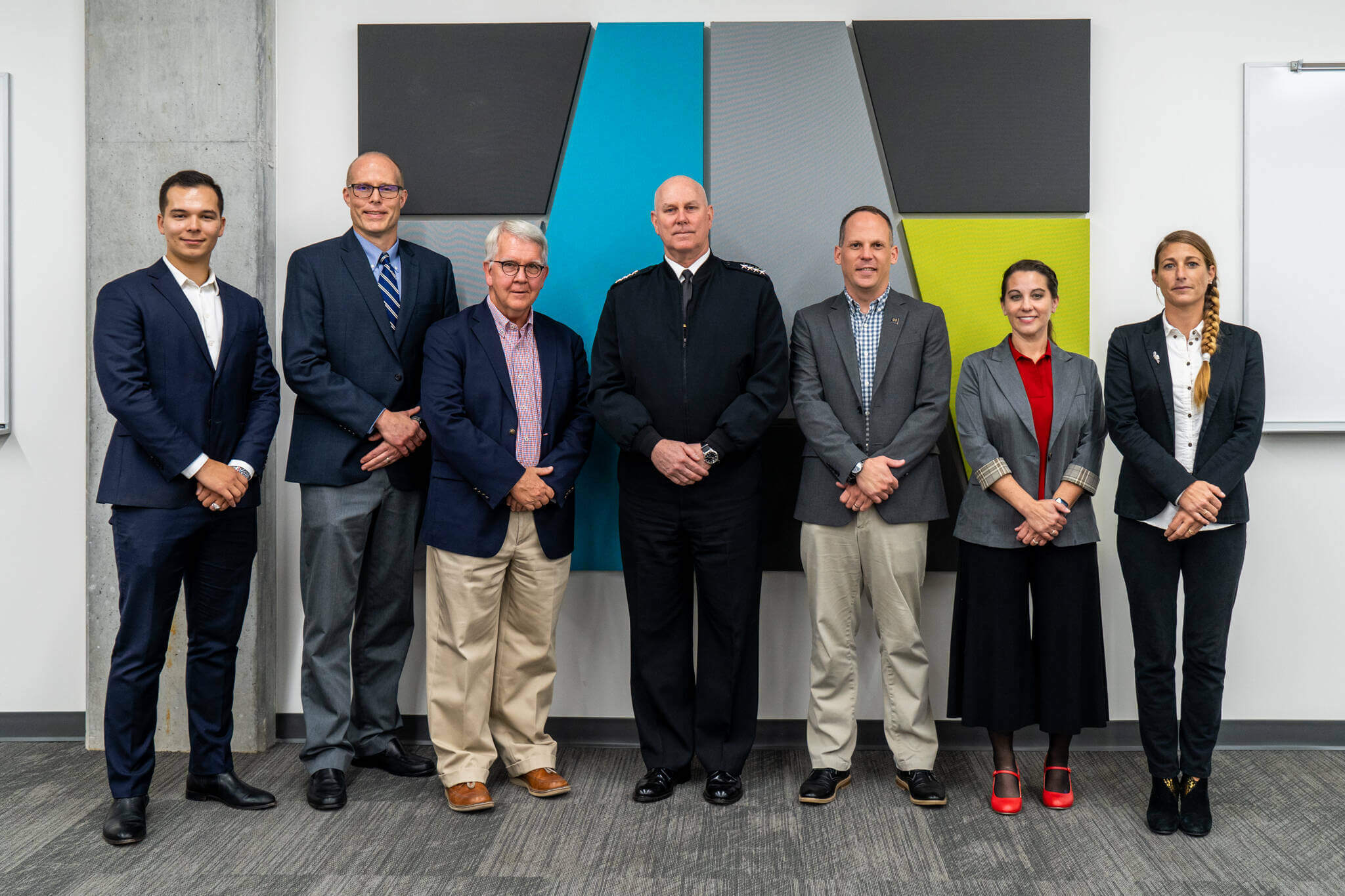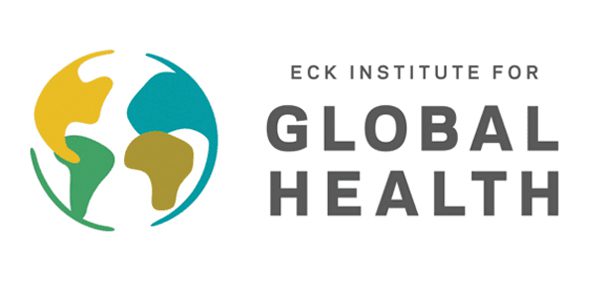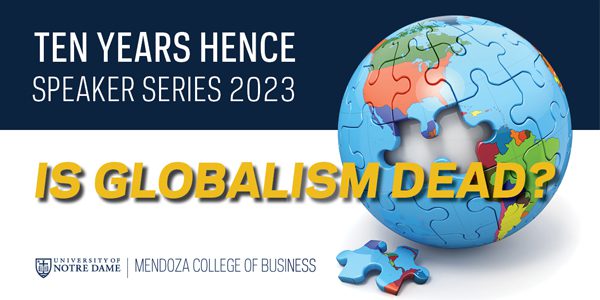Where We’re Going: Healthcare – Global Viewpoint
Subscribe to the ThinkND podcast on Apple, Spotify, or Google.
Featured Speakers:
- Dr. Brian Donley, Chief Executive Officer, Cleveland Clinic London
- Dr. Juliana Otieno, Former CEO, JOOTRH; Founder, Rusalia Research Foundation
- Dr. Bernard Nahlen, Director, Eck Institute for Global Health, University of Notre Dame
For the third week of the “Where We’re Going: Healthcare” series, moderator Dr. Bernard Nahlen, Director, Eck Institute for Global Health brought in Notre Dame alumni who can shed light on healthcare from a global perspective. The focus this week was the Notre Dame campus viewpoint on how Covid-19 has affected healthcare worldwide, and how this will change the future of healthcare indefinitely.
Nahlen was joined by Dr. Juliana Otieno, Former CEO of Western Kenya’s largest teaching and referral hospital (JOOTRH); Founder, Rusalia Research Foundation. She worked in the public health sector of Kenya for 34 years. He was also joined by Dr. Brian Donley ’86, Chief Executive Officer of Cleveland Clinic London.
The group then began a discussion regarding some of the major challenges that the world may face ahead regarding the vaccine.
Prior to the pandemic, Dr. Otieno explained that the Kenyan government’s healthcare resources were already overstretched. Resources allocated to diseases such as malaria, tuberculosis and HIV were redirected to COVID-19 when the pandemic hit Kenya, which, for example, resulted in these diseases not being treated hence more deaths could have occurred . The public hospitals were overwhelmed which also led to strikes by healthcare workers but also the creation of COVID-19 centers. [1]
Dr. Otieno then discussed some of the rumors circulating that the vaccine roll-out is not on schedule and will finish in 2023—this is not true as confirmed by the ministry of health. This is also not the only negative rumor regarding the vaccine; there may also be fear of the vaccine being laced with family pills and concerns with the quality of the vaccine. Moreover, she is worried about the private sector of healthcare workers, because the government may not provide for them as much when distributing the vaccine. Unfortunately, if the private sector decides to import the vaccine, the price may increase which can be disastrous for the country. One physical challenge of vaccine rollout is how to keep it cold in areas without electricity.
Next, Dr. Donley discussed the new Cleveland Clinic hospital that will be built in London. He explained that he wants to integrate the best of the UK with the best of the Cleveland Clinic to create a world-class model of care. He thinks that quality, safety, and experience of care will benefit from this. One innovation that will be brought to the UK is a closed loop pharmacy system, which uses digital infrastructure and robotic technologies to reduce errors in medicines administration.
Next, Dr. Otieno discussed innovations she has seen in Kenya that she thinks have been game-changers to healthcare. First, she said the mobile phone has definitely impacted care in Kenya. It is used a lot for malaria cases, HIV cases and more. It is used to help remind patients about vaccinations, appointments and testing. Telemedicine is also on the rise, especially in university hospitals. It has not been around in Kenya nearly as long as it has in America, however it is being utilized more. She stated that digitalization of patient records definitely needs to be strengthened.
Finally, Nahlen asked guests what the world of healthcare will look like ten years from now. Dr. Otieno first shared the following quote: “We must be our brothers’ keepers. Whether your brother is poor, whether your brother is rich, whether you are from a rich part of the country—the world is one, and you must consider doing things as one people.” She then said that it is imperative to strengthen training of medical personnel in the next ten years, and we must focus on things such as food insecurity. Finally, she stated the importance of avoiding the emergence of new diseases in years to come. Dr. Donley agreed that “everyone must come together for what is best for humankind.” He predicts a globalization of healthcare in the next ten years. He also foresees a greater focus on the social determinants of health. Interestingly, 40% of the social determinants of health are socioeconomic, 30% are healthy behaviors, and only 20% is healthcare. The last 10% is environment. He believes that the new technologies available in healthcare will improve care as well.
- “We saw it throughout this pandemic; the deep, deep passion that exists in caregivers for another human being in their time of greatest need.” (Dr. Brian Donley, 18:11)
- There are many rumors going around about the vaccine, and these can be damaging for roll-out purposes. (21:22)
- Dr. Donley wants to integrate the best of the Cleveland Clinic with the best of UK healthcare. (22:40)
- “With any new vaccine that comes into Kenya, we always have negative publicity, and the Covid-19 vaccine is not immune to it.” (Dr. Juliana Otieno, 22:45)
- “We’re not bringing the Cleveland Clinic to London; we’re bringing the best of what we do, and we’re integrating it with the best of UK healthcare.” (Dr. Brian Donley, 25:35)
- Telemedicine is also on the rise, especially in university hospitals. It has not been around in Kenya nearly as long as it has in America, however it is being utilized more. (32:39)
- It is important to have diversity of thought when it comes to healthcare, which will help with the globalization of healthcare. (36:41)
- “Diversity of thought doesn’t just let us get better answers to the questions we want to solve, but goes a step further and gets us to better questions to solve.” (Dr. Brian Donley, 36:44)
- “We must be our brothers’ keepers. Whether your brother is poor, whether your brother is rich, whether you are from a rich part of the country—the world is one, and you must consider doing things as one people.” (Dr. Juliana Otieno, 42:55)
- Guests predict a major globalization of healthcare in the coming years. (43:20)
Related Content
Notre Dame researchers present latest findings and innovations to nation’s second highest-ranking military officer
In October 2022, Admiral Christopher W. Grady ’84, the Vice Chairman of the Joint Chiefs of Staff, joined faculty members at the University of Notre Dame for an update on the...
Read ArticleND Research Explores: The Eck Institute for Global Health
The University of Notre Dame’s Eck Institute for Global Health (EIGH), under the direction of Bernard Nahlen, serves as a university-wide enterprise that recognizes health as a...
watch videoCOVID-19 and the Future of Health Care
This year marks the 21st anniversary of the Mendoza College of Business signature lecture series, Ten Years Hence. We invite you to join with us to see and hear a variety of...
View Event


